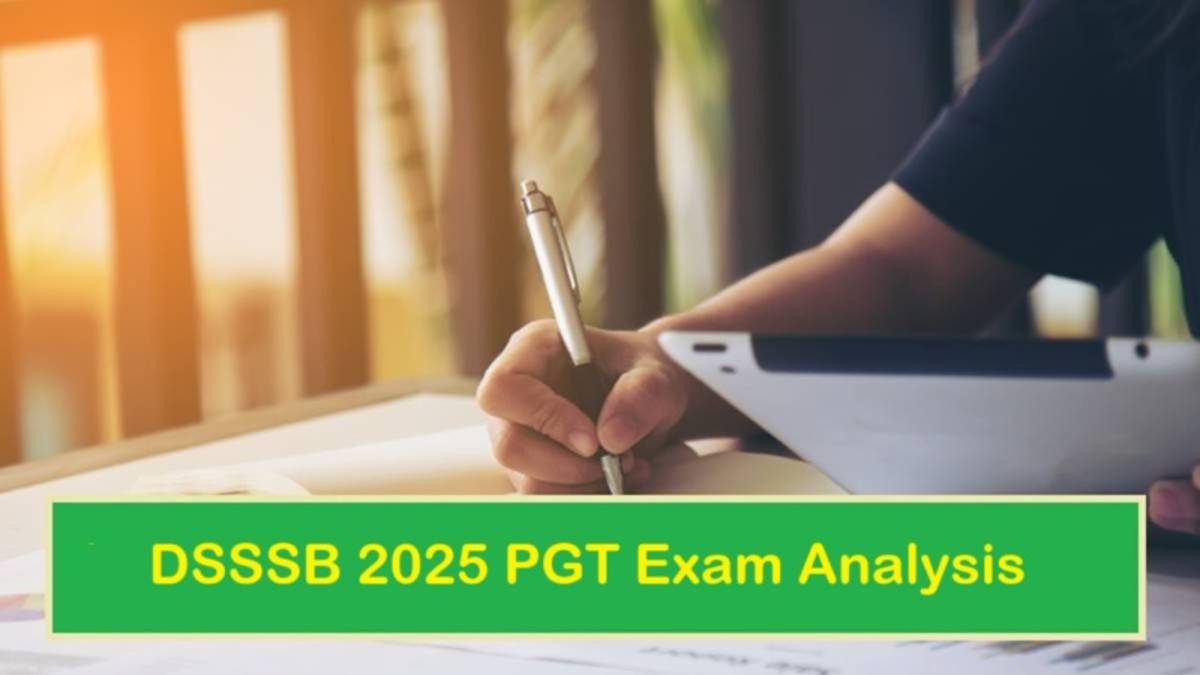The DSSSB 2025 PGT posts exam started on July 7, 2025. The last exam will be on August 4, 2025. The PGT English exam (post code 16/24) is over on July 7, 2025. Candidates can check the date-wise DSSSB 2025 exam analysis for each shift here, which is based on the students' responses. Scroll down for more details.
DSSSB 2025 PGT Exam Analysis: The Delhi Subordinate Service Selection Board (DSSSB) started the exam for the PGT posts from July 7, 2025. The last exam will be conducted on August 4, 2025. On July 7, 2025, PGT English exam was conducted in the second shift from 2 PM to 5 PM. Candidates will be able to check here the DSSSB 2025 exam analysis for the PGT English (post code 16/24) based on the students' responses including the difficulty level of the exam, topics asked, questions and answers & more.
The DSSSB PGT Exam 2025 consists of two sections, namely Section I and Section II, which are designed to evaluate both general and subject-specific knowledge. Section I carries 100 marks and tests candidates General awareness, including History, Polity, Geography, Economics, Sports, Art & Culture, etc. On the other hand, Section II consists of subject-specific topics and 200 marks. The total marks of the paper are 300.
- DSSSB 2025 July 7 PGT Exam Analysis (Shift 2): Student Reactions
- DSSSB 2025 Exam Pattern
- DSSSB 2025 PGT Syllabus
DSSSB 2025 July 7 PGT Exam Analysis (Shift 2): Student Reactions
Available Soon!
Subjects covered in section 1 of the DSSSB PGT 2025 exam are mentioned below:
- Mental Ability and Reasoning Ability
- Numerical Aptitude and Data Interpretation
- English Language and Comprehension
- General Awareness
- Hindi Language and Comprehension
Topics covers in DSSSB General Awareness section are History, Polity, Constitution, Sports, Art & Culture, Geography, Economics, Everyday Science, Scientific Research, National/International Organisations.
DSSSB 2025 Exam Pattern
Candidates can check below the DSSSB Exam Pattern 2025.
| Section |
Subjects |
Maximum Questions |
Maximum Marks |
|---|---|---|---|
| Section 1 |
Mental Ability and Reasoning Ability |
20 |
20 |
| Numerical Aptitude and Data Interpretation |
20 |
20 |
|
| English Language and Comprehension |
20 |
20 |
|
| General Awareness |
20 |
20 |
|
| Hindi Language and Comprehension |
20 |
20 |
|
| Section 2 |
Subject concerned (MCQ pertaining to PG course qualifying and Teaching Methodology) |
200 |
|
| Total |
300 |
300 |
|
The candidate will get 1 mark for each correct answer and also there is a provision of 0.25 negative marking in the examination that is 0.25 marks will be deducted from the total score.

DSSSB 2025 PGT Syllabus
Candidates can check below the DSSSB 2025 Syllabus of PGT English.
| DSSSB 2025 PGT English Syllabus PDF (post code 16/24) | Download Here |
Read More:

Role: Editorial Domain
Education: Mass Com & Journalism, MSC Mathematics
Expertise: Sarkari Exam Expert
About
Shikha Goyal is a double post graduate with more than 12 years of experience in education domain, journal
Read Full BioExplore Other Exams
7 Mar '24 | MP Police Constable Result |
15 Sep '23 | MP Police Constable Answer Key |
Mar '26 | SSC CGL 2026 Application Dates |
May '26 | SSC CGL 2026 Tier-I Exam Dates |
21 Jun '26 | UPSC ESE (IES) 2026 Mains Exam... |
8 Feb '26 | UPSC ESE (IES) 2026 Prelims Ex... |
31 Jan '25 | RBI Assistant 2025 Notificatio... |
31 Dec '23 | RBI Assistant mains exam 2023 |
Feb '26 | CTET 2026 answer key |
7 Feb '26 - 8 Feb '26 | CTET 2026 Exam Date |
9 Nov '25 | IBPS SO Mains Exam 2025 |
1 Jul '25 - 28 Jul '25 | IBPS SO application form 2025 |
10 Aug '22 | UPPCL JE final result 2022 |
7 Aug '22 | Document verification for Civi... |
22 Aug '26 - 23 Aug '26 | IBPS PO 2026 Prelims Exam |
4 Oct '26 | IBPS PO 2026 Mains Exam |




DSSSB exam analysis helps candidates in knowing the section-wise and overall difficulty level of questions asked in the exam. Going through the DSSSB 2024 exam analysis helps candidates know the topics from which the questions are asked in the exam along with their difficulty level. The DSSSB exam analysis 2024 also highlights the important topics, section-wise distribution of questions, good attempts, and expected cut-off marks.